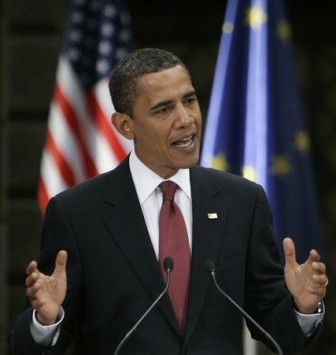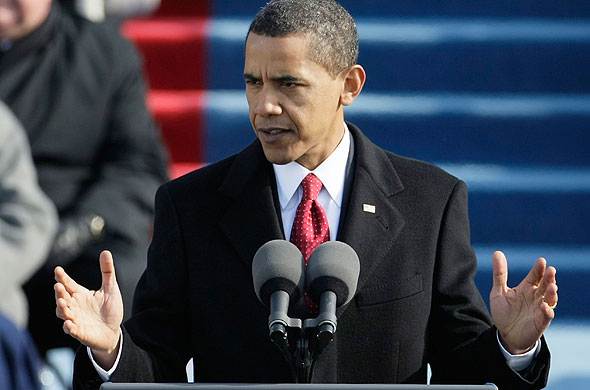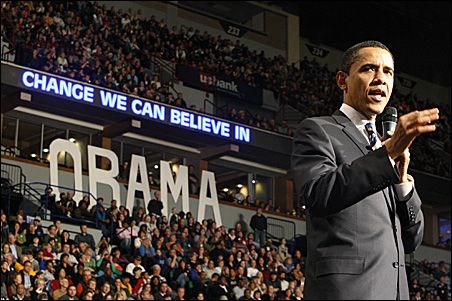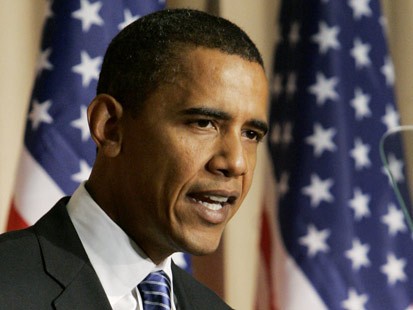 In a breathtaking speech, delivered before a backdrop of American flags, Barack Obama attempted yesterday to lance the boil of the ugly racial row that threatens to destroy his campaign for the presidency.
In a breathtaking speech, delivered before a backdrop of American flags, Barack Obama attempted yesterday to lance the boil of the ugly racial row that threatens to destroy his campaign for the presidency. Delivering what one commentator described as the most personal and extensive discussion of the legacy of slavery made by any major American politician in memory, he said it was time for Americans to "move beyond some of our old racial wounds".
Commentators were quick to describe the unconventional speech, which Obama finished writing at 3am yesterday, as the most audacious and politically risky gambit of his career.
Saying he was "married to a black American who carries within her the blood of slaves and slaveowners – an inheritance we pass on to our two precious daughters," he implicitly rebuked those who question his wife Michelle's patriotism, after she recently said "for the first time in my adult lifetime, I am really proud of my country".
Mr Obama said: "I have brothers, sisters, nieces, nephews, uncles and cousins, of every race and every hue, scattered across three continents, and for as long as I live," he said, "I will never forget that in no other country on earth is my story even possible."
Speaking near the spot where the US Declaration of Independence was written in the spring of 1787, Mr Obama took his theme from that iconic document, saying he wanted to transform the divisiveness of the race row into a quest for "a more perfect union".
In so doing, he unambiguously condemned the racially incendiary remarks of his Chicago pastor, the Rev Jeremiah Wright, saying they were "not only wrong, but divisive; divisive at a time when we need unity".
Snippets of some sermons are being endlessly looped on American television and on YouTube, showing Mr Wright describing the US as a racist country with a murderous foreign policy and a corrupt government.
The two most damaging video clips show Mr Wright claiming that the US brought the 9/11 attacks on itself and that blacks should sing "God Damn" not "God Bless America".
Mr Obama, frequently interrupted by applause, provided his most complete explanation of his long association with Mr Wright, the pastor who married him and baptised his children, despite his fiery rhetoric. "Did I know him to be an occasionally fierce critic of American domestic and foreign policy? Of course. Did I ever hear him make remarks that could be considered controversial while I sat in church? Yes.
"Did I strongly disagree with many of his political views? Absolutely – just as I'm sure many of you have heard remarks from your pastors, priests or rabbis with which you strongly disagreed."
But even as he condemned the remarks of his friend and spiritual adviser, the Illinois senator delivered some home truths about race relations in America.
Throughout the election Mr Obama has tried to avoid embroiling his campaign in America's fractious racial debate, despite the efforts of his opponents to do so. In South Carolina at the beginning of the year, Bill Clinton was widely criticised for casting Obama as no more than a black candidate, popular in a state with a heavily black electorate but not a serious contender for the presidency.
And, earlier this month, Geraldine Ferraro, the 1984 Vice-Presidential nominee, was forced to leave Clinton's finance committee after saying that Obama was front-runner because as a black man he was enjoying political favouritism.
But yesterday – facing the Wright furore deemed by some advisers to be the greatest challenge of his candidacy for the presidency – Mr Obama tackled the issue of racial politics head on, an approach normally guaranteed to clear a room or destroy a budding political career.
"I suppose the politically safe thing would be to move on from this episode and just hope that it fades into the woodwork," he said, adding that "race is an issue that I believe this nation cannot afford to ignore right now." As the son of a black man from Kenya and a white woman from Kansas, Mr Obama has personally juggled racial divisions and seen first-hand that they can be overcome. "I can no more disown him [Wright] than I can disown my white grandmother ... a woman who once confessed her fear of black men who passed by her on the street, and who on more than one occasion has uttered racial or ethnic stereotypes that made me cringe."
Speaking of America's "racial stalemate", he said: "I have asserted a firm conviction – a conviction rooted in my faith in God and my faith in the American people – that working together we can move beyond some of our old racial wounds," he said. He talked about the anger among African-Africans that could be heard at the barbers or the beauty parlour, a hangover from the days of segregation. But he was also swift to acknowledge what he called "the resentments of white Americans" that should not be dismissed as misguided or racist.
The complexities of race were something the United States had not yet made perfect, Mr Obama said. "And if we walk away now, if we simply retreat into our respective corners, we will never be able to come together and solve challenges like health care or education or the need to find good jobs for every American."
He expressed exasperation with the media for scouring every exit poll during the tight Democratic race for signs of racial polarisation when his campaign message of unity had led to commanding victories in overwhelmingly white states. The election had recently taken on, what he said was "a particularly divisive turn", which was a political risk to his campaign ahead of the Pennsylvania primary on 22 April where white votes will play a key role.
"We can play Reverend Wright's sermons on every channel, every day and talk about them from now until the election, and make the only question in this campaign whether or not the American people think that I somehow believe or sympathise with his most offensive words," he said. "We can pounce on some gaffe by a Hillary supporter as evidence that she's playing the race card, or we can speculate on whether white men will all flock to John McCain in the general election regardless of his policies.
"That is one option," Mr Obama said. "Or, at this moment, in this election, we can come together and say, 'Not this time'.














No comments:
Post a Comment